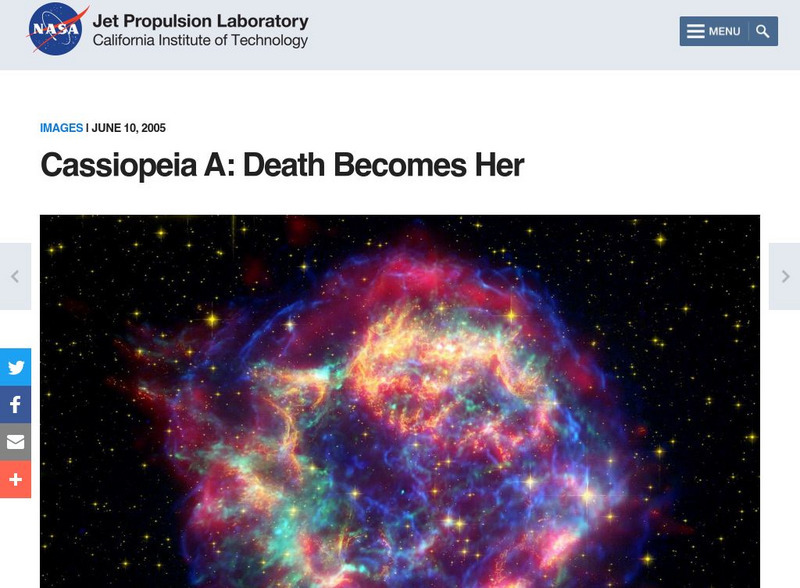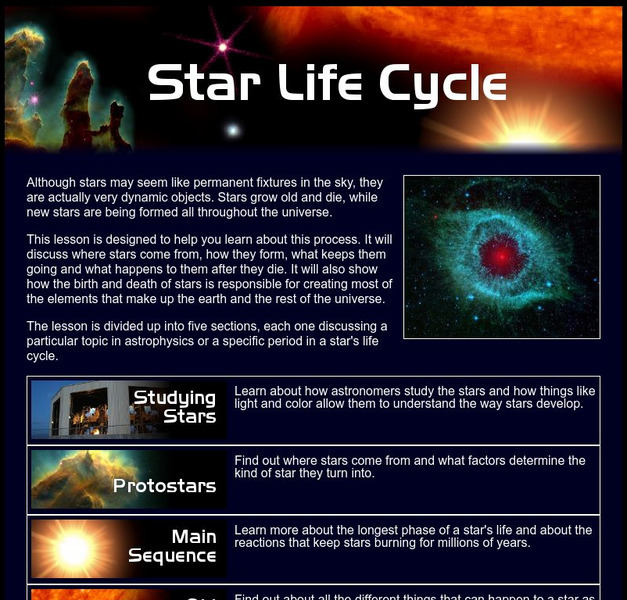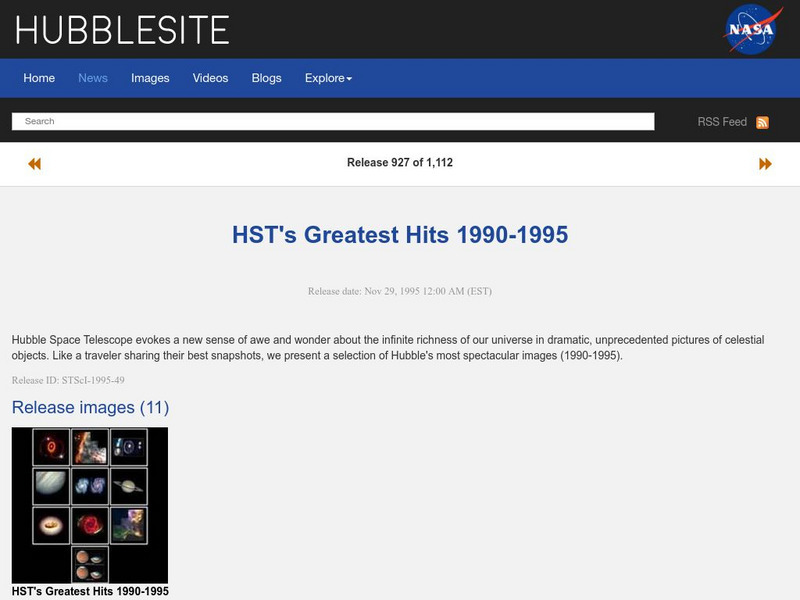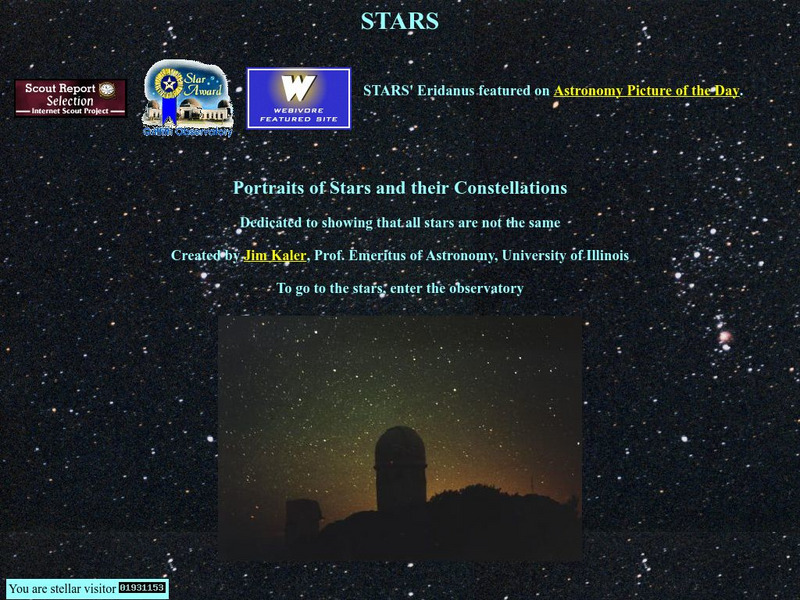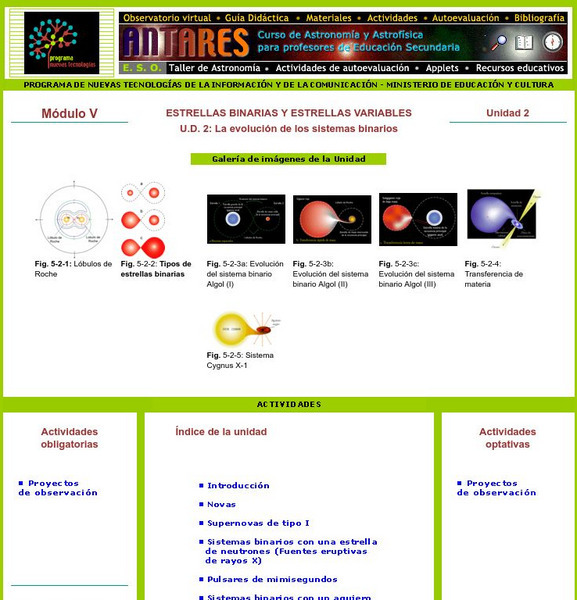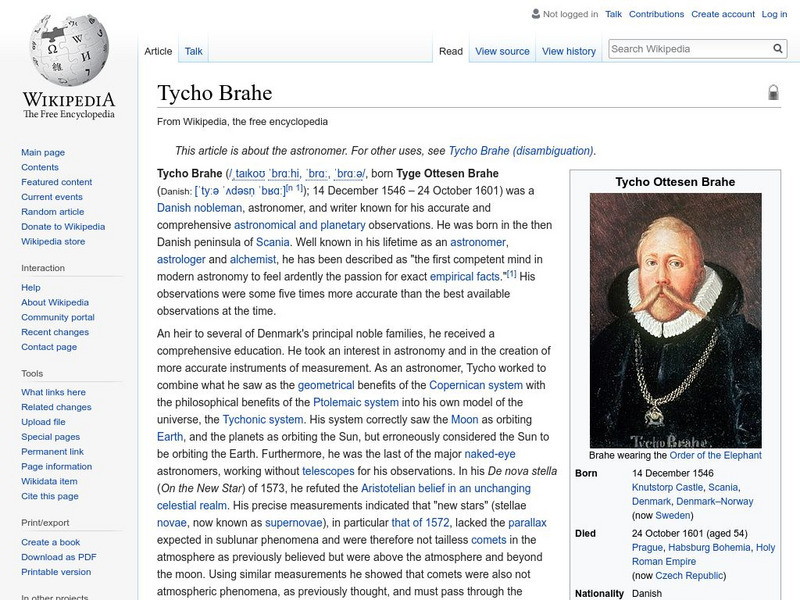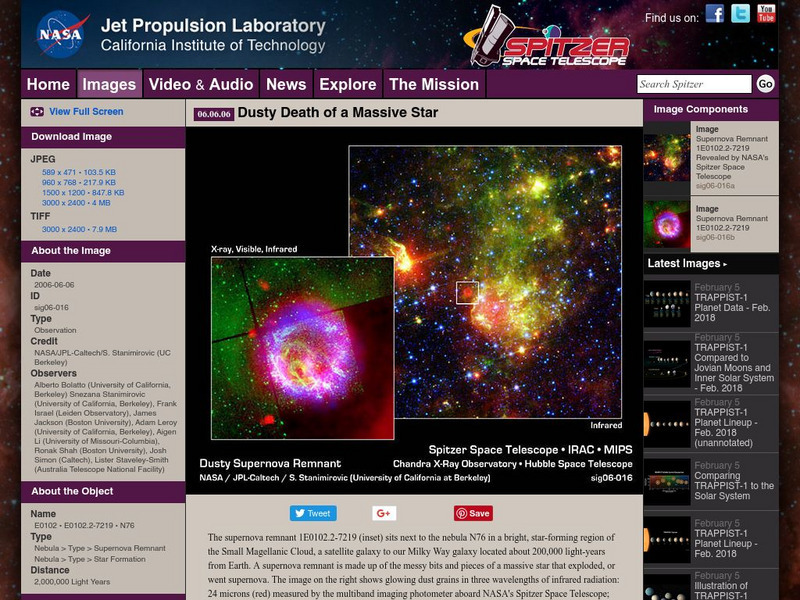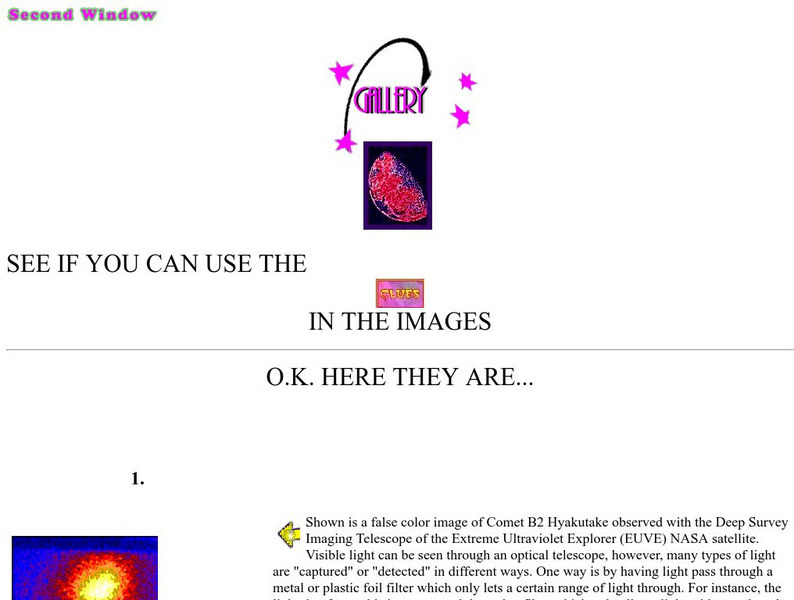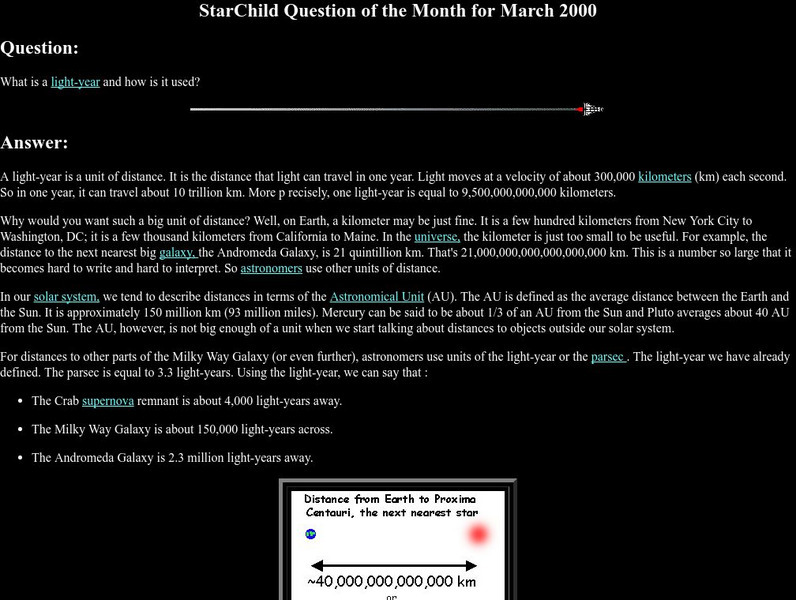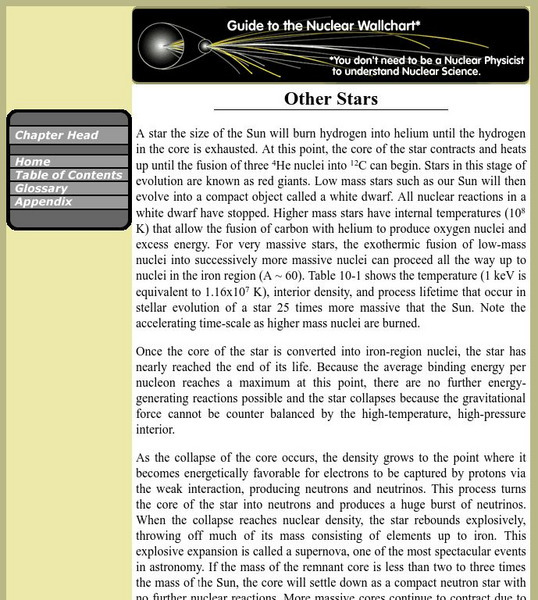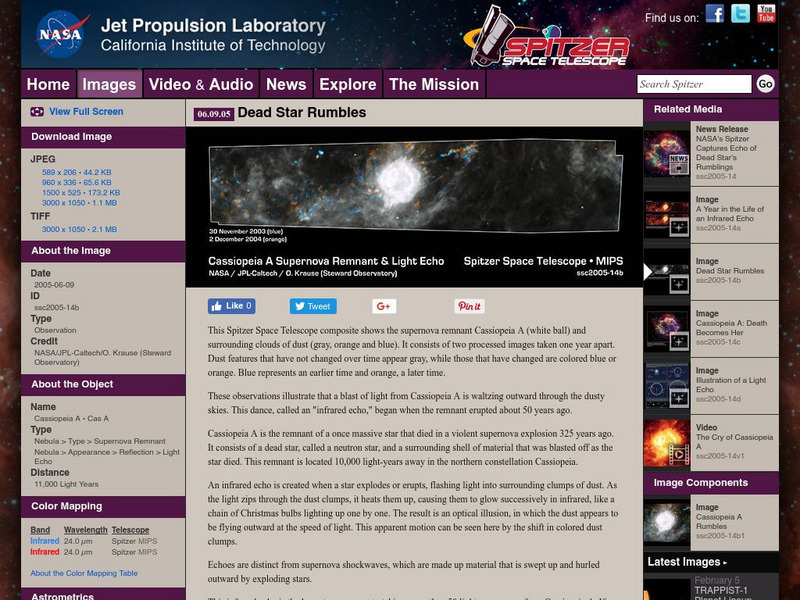Hi, what do you want to do?
NASA
Nasa: Cassiopeia A
This image, titled "Cassiopeia A: Death Becomes Her" features the supernova remnants of Cassiopeia A. The text under the image details various specifics about the picture.
Massachusetts Institute of Technology
Mit: Open Course Ware: Courses: Physics: Classical Mechanics
College-level online course highlighting the study of classical mechanics. This course focuses on Newtonian mechanics, fluid mechanics, and kinetic gas theory. Course features include a 35 video lecture series by Walter Lewin. Also link...
University of Utah
University of Utah: Aspire: Life Cycle of a Star
Experience this impressive interactive website about the life cycle of a star.
PBS
Pbs Learning Media: Pulsars: Little Green Men
The story behind Jocelyn Bell's role in the discovery of pulsars is told in this colorful, comic-book-style resource from A Science Odyssey Web site.
Space Telescope Science Institute
Hubble Space Photographs: Hst's Greatest Hits 1990 1995
Breathtaking images from the Hubble Space Telescope give a new perspective to our world.
Georgia Department of Education
Ga Virtual Learning: A Brief History of Astronomy
In this interactive module students will explore what different ancient cultures believe was an explanation of the stars and planets. They will look at how the work of Nicolas Copernicus revolutionize the world of astronomy and learn how...
Curated OER
Science Kids: Science Images: Supernova
A photo of a distant supernova taken by the Hubble Space Telescope.
University of Illinois
University of Illinois: Stars and Constellations
A large collection of information about and photos of the starts and constellations in the sky.
Ministerio de Educación (Spain)
Ministerio De Educacion: Medio Interestelar Modulo Vi Unidad 1
In this module you will learn about the interstellar extinction and study about the different types of nebulae and supernova.
Ministerio de Educación (Spain)
Ministerio De Educacion: Estrellas Binarias Y Variables Modulo v Unidad 2
In this module you will study about Novae and Supernovae and will learn about the evolution of the binary system.
Space Telescope Science Institute
Nasa: Hubble Space Telescope: Stars
At this site from the HubbleSite you can learn all about a star's life, birth, and death. Site contains links to a star movie as well as space/time location.
Wikimedia
Wikipedia: Tycho Brahe
A great overview of the life of astronomer Tycho Brahe from Wikipedia Encyclopedia. This article discusses his contributions to the world of astronomy, and his building of his observatory called Uraniborg.
Other
Cosmic Wonders: Nebulae
Various different types of nebulae can be explored on this site. View and learn about this stellar phenomena and how they contribute to the growth of the solar system.
CK-12 Foundation
Ck 12: Earth Science: Life Cycles of Stars
[Free Registration/Login may be required to access all resource tools.] Examines the formation of a star and the main sequence of the star's life cycle.
California Institute of Technology
Spitzer Science Center: Where Galactic Snakes Live
Following the title, "Where Galactic Snakes Live" this site examines an image of "Galactic Snakes" which are actually clouds larger than several solar systems. The text below the image proceeds to explain certain stellar features...
Space Telescope Science Institute
Hubble Site: A Decade of Discovery
Take a look back at a decade of discovery concerning the Hubble from the HubbleSite. Site contains links to a portfolio of pictures, a quicktime video as well as the vault of discovery.
California Institute of Technology
Spitzer Science Center: Crab Nebula
This image, titled "Crab Nebula Supernova Remnant" features the Crab Nebula which was noted in the constellation of Taurus by Chinese astronomers. The text under the image details various specifics about the picture.
California Institute of Technology
Spitzer Science Center: Dusty Death of a Massive Star
Under the heading, "Dusty Death of a Massive Star" this site examines specific details of an image displaying bits and pieces of a star after a supernova. The image is enhanced and enlarged in a second picture.
University of California
Center for Science Education: Gallery
A gallery of astronomy images which depict galaxies, comets, the moon, planets, nebulae, supernovae as seen in various regions of the electromagnetic spectrum. Each image in the gallery is described. Fascinating!
California Institute of Technology
Spitzer Science Center: Massive Star's Death
Under the heading, "The (Almost) Invisible Aftermath of a Massive Star's Death" this site examines specific details of an image which demonstrates the death of a star that does not end in an impressive supernova but rather fades away.
NASA
Nasa Star Child: What Is a Light Year and How Is It Used?
This is a definition and example of how distance is measured in astronomy, such as the distance between our earth and the stars.
Lawrence Berkeley National Laboratory
Berkeley Lab: Other Stars
Describes other stars besides the sun in our galaxy and the major stages in the evolution of a massive star.
California Institute of Technology
Spitzer Science Center: Dead Star Rumbles
This image, titled "Dead Star Rumbles" features a medium-sized image of the remnants of Cassiopeia A and its surrounding infrared echo. The text under the image details various specifics about the picture.
Curated OER
Sequence of Events in a Supernova Explosion
The complex sequence of events in a supernova explosion are explained and illustrated.





